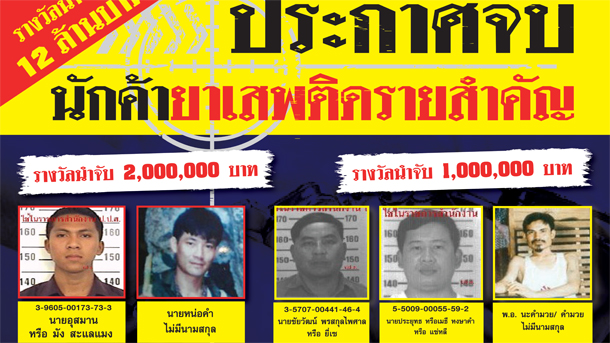Arrested drugs suspect Thai Police Snr-Sgt-Maj Manas Seupho told investigating officers in Bangkok that his illicit smuggling network is run by Burmese narcotics kingpin Yi Say, also known as Chaiwat Pornsakulpaisal, who is currently hiding inside Burma.
The traffic policeman made the statement in the wake of his arrest in Lampang, Chiang Mai Province, northern Thailand, for suspected trafficking offences, according to Thai media reports.
After the disgraced law-enforcer’s statement, the Thai authorities have doubled the award for anyone who provides information leading to the arrest of Yi Say from one to two million baht (US $65,000).
Manas claims that Yi Say is the key player in the multi-million dollar business of trafficking drugs from the Shan State border town of Tachileik into northern Thailand.
Thailand-based English language newspaper The Bangkok Post reported on Friday that the detained policeman was being hunted by fellow officers and anti-narcotic officials since Monday. He allegedly carried 1.2 million methamphetamine tablets and five kilograms of crystal methamphetamine in his truck through a checkpoint in Lampang. He then went on the run but eventually surrendered to police on Wednesday.
Manas disclosed that he was paid one million baht each time he carried a shipment from Tachileik to Bangkok, and the scam operated under the authority of Yi Say, according to Thai media reports. There are nine dealers who work under Yi Say’s who are now being chased by Thai anti-drugs officials.
Keen Burma drugs watcher Khunsai Jaiyen, the editor of the Thailand-based Shan Herald Agency for News, said that Yi Say is an ethnic Lahu and the leader of a paramilitary group based in Yay Bu San (meaning hot spring) in western Tachileik of southern Shan State.
Khunsai Jaiyen said it was common knowledge that Yi Say was operating a drugs smuggling operation at the border, but it still would not be easy to arrest him as his Lahu militia has full power in the region and is loyal to the Burmese government.
On April 20, Thai Deputy Prime Minister Chalerm Yubamrung announced that the Office of the Narcotics Control Board was offering 12 million baht (US $388,000) in rewards for the capture of the country’s 25 most-wanted drug dealers.
Three of those on the list are Burmese nationals—Yi Say, Naw Kham and Saw Lah Pwe. One of the group, Naw Kham, an ethnic Shan who ran smuggling and piracy operations on the Golden Triangle section of the Mekong River where the borders of Thailand, Burma and Laos meet, was arrested on April 25 and subsequently convicted by a Chinese court of murder, kidnapping, drug smuggling and ship hijacking.
The US Congressional Research Service estimated in 2010 that Burma’s drugs export trade was worth between $1 billion and $2 billion annually.
According to the United Nations Office for Drugs and Crime, more than 200,000 farming families are estimated to be growing opium poppies across 100,000 acres (40,000 hectares) and 90 percent of them are in Shan State. It said that Burma is the source of nearly one quarter of the poppy plants used to make opium and heroin, making it the world’s biggest illegal opiate supplier after Afghanistan.
















